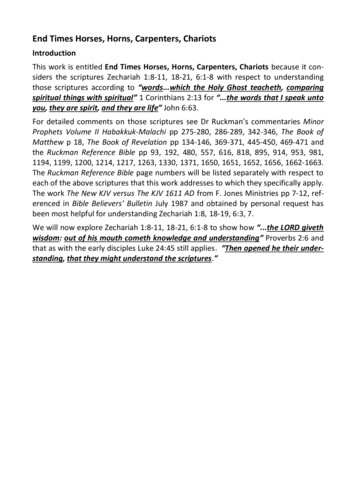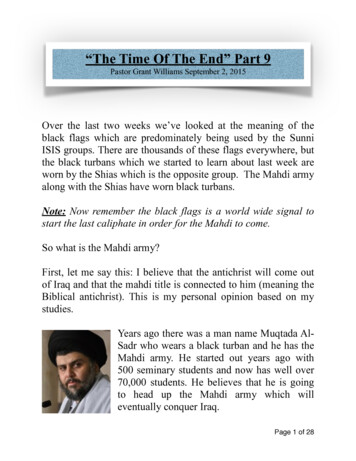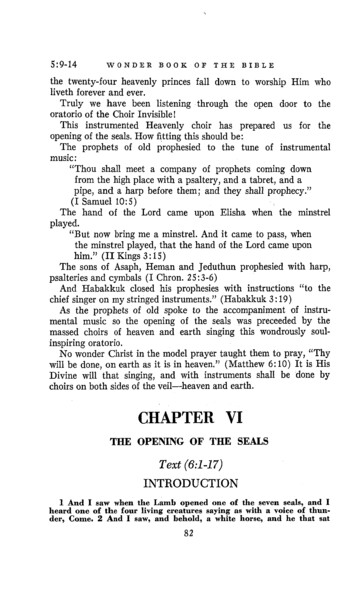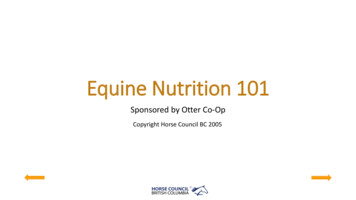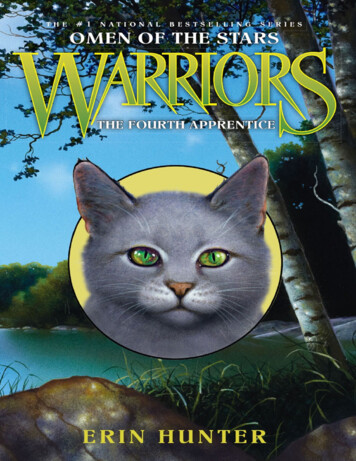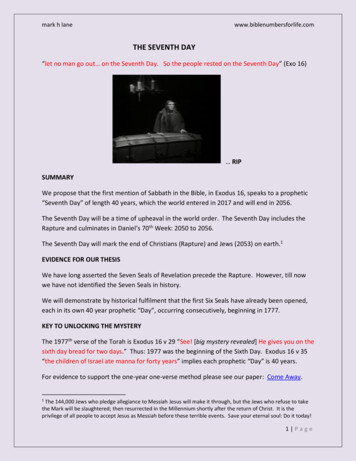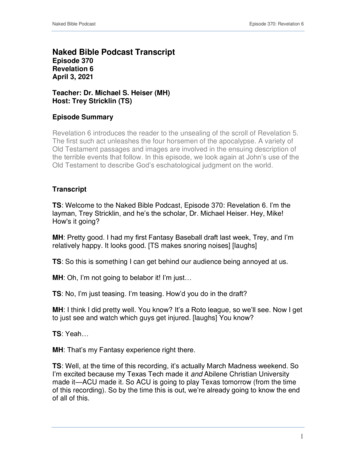
Transcription
THE PALE HORSEAgatha Christie
Foreword by Mark EasterbrookThere are two methods, it seems to me, of approaching this strangebusiness of the Pale Horse. In spite of the dictum of the White King,it is difficult to achieve simplicity. One cannot, that is to say, "Beginat the beginning, go on to the end, and then stop." For where is thebeginning?To a historian, that always is the difficulty. At what point in historydoes one particular portion of history begin?In this case, you can begin at the moment when Father Gorman setforth from his presbytery to visit a dying woman. Or you can startbefore that, on a certain evening in Chelsea.Perhaps, since I am writing the greater part of this narrative myself,it is there that I should begin.Chapter 1The Espresso machine behind my shoulder hissed like an angrysnake. The noise it made had a sinister, not to say devilish,
suggestion about it. Perhaps, I reflected, most of our contemporarynoises carry that implication. The intimidating angry scream of jetplanes as they flash across the sky, the slow menacing rumble of atube train approaching through its tunnel; the heavy road transportthat shakes the very foundations of your house. even the minordomestic noises of today, beneficial in action though they may be,yet carry a kind of alert. The dishwashers, the refrigerators, thepressure cookers, the whining vacuum cleaners. "Be careful," theyall seem to say. "I am a genie harnessed to your service, but if yourcontrol of me fails."A dangerous world - that was it, a dangerous world.I stirred the foaming cup placed in front of me. It smelled pleasant."What else will you have? Nice banana and bacon sandwich?"It seemed an odd juxtaposition to me. Bananas I connected with mychildhood - or occasionally flambй with sugar and rum. Bacon, inmy mind, was firmly associated with eggs. However, when inChelsea, eat as Chelsea does. I agreed to a nice banana and baconsandwich.Although I lived in Chelsea - that is to say, I had had a furnished flatthere for the last three months - I was in every other way a strangerin these parts. I was writing a book on certain aspects of Mogularchitecture, but for that purpose I could have lived in Hampsteador Bloomsbury or Streatham or Chelsea and it would have been allthe same to me. I was oblivious of my surroundings except for the
tools of my trade, and the neighbourhood in which I lived wascompletely indifferent to me; I existed in a world of my own.On this particular evening, however, I had suffered from one ofthose sudden revulsions that all writers know.Mogul architecture, Mogul emperors, the Mogul way of life - and allthe fascinating problems it raised, became suddenly as dust andashes. What did they matter? Why did I want to write about them?I flicked back various pages, rereading what I had written. It allseemed to me uniformly bad - poorly written and singularly devoidof interest. Whoever had said "History is bunk" (Henry Ford?) hadbeen absolutely right.I pushed back my manuscript with loathing, got up and looked atmy watch. The time was close on eleven p.m. I tried to remember if Ihad had dinner. From my inner sensations I thought not. Lunch,yes, at the Athenaeum. That was a long time ago.I went and looked into the refrigerator. There was a small remnantof desiccated tongue. I looked at it without favor. So it was that Iwandered out into the King's Road, and eventually turned into anEspresso coffee bar with the name Luigi written in red neon lightacross its window, and was now contemplating a bacon andbanana sandwich while I reflected on the sinister implications ofpresent-day noises and their atmospheric effects.All of them, I thought, had something in common with my earlymemories of pantomime. Davy Jones arriving from his locker in
clouds of smoke! Trapdoors and windows that exuded the infernalpowers of evil, challenging and defying a Good Fairy Diamond, orsome such name, who in turn waved an inadequate-looking wandand recited hopeful platitudes as to the ultimate triumph of good ina flat voice, thus prefacing the inevitable "song of the moment"which never had anything to do with the story of that particularpantomime.It came to me suddenly that evil was, perhaps, necessarily alwaysmore impressive than good. It had to make a show! It had to startleand challenge! It was instability attacking stability. And in the end, Ithought, stability will always win. Stability can survive the tritenessof Good Fairy Diamond; the flat voice, the rhymed couplet, even theirrelevant vocal statement of "There's a winding road runs downthe hill, To the olde world town I love." All very poor weapons itwould seem, and yet those weapons would inevitably prevail. Thepantomime would end in the way it always ended. The staircase,and the descending cast in order of seniority, with Good FairyDiamond, practising the Christian virtue of humility and not seekingto be first (or in this case, last) but arriving about halfway throughthe procession, side by side with her late opponent, now seen to beno longer the snarling Demon King breathing fire and brimstone,but just a man dressed up in red tights.The Espresso hissed again in my ear. I signalled for another cup ofcoffee and looked round me. A sister of mine was always accusingme of not being observant, not noticing what was going on. "Youlive in a world of your own," she would say accusingly. Now, with afeeling of conscious virtue, I took note of what was going on. It wasalmost impossible not to read about the coffee bars of Chelsea and
their patrons every day in the newspapers; this was my chance tomake my own appraisal of contemporary life.It was rather dark in the Espresso, so you could not see veryclearly. The clientele were almost all young people. They were, Isupposed vaguely, what was called the offbeat generation. Thegirls looked, as girls always did look to me nowadays, dirty. Theyalso seemed to be much too warmly dressed. I had noticed thatwhen I had gone out a few weeks ago to dine with some friends. Thegirl who had sat next to me had been about twenty. The restaurantwas hot, but she had worn a yellow wool pullover, a black skirt andblack woollen stockings, and the perspiration poured down herface all through the meal. She smelled of perspiration-soaked wooland also, strongly, of unwashed hair. She was said, according tomy friends, to be very attractive. Not to me! My only reaction was ayearning to throw her into a hot bath, give her a cake of soap andurge her to get on with it! Which just showed, I suppose, how out oftouch with the times I was. Perhaps it came of having lived abroadso much. I recalled with pleasure Indian women with theirbeautifully coiled black hair, and their saris of pure bright colourshanging in graceful folds, and the rhythmic sway of their bodies asthey walked.I was recalled from these pleasant thoughts by a suddenaccentuation of noise. Two young women at the table next to mehad started a quarrel. The young men who were with them tried toadjust things, but without avail.Suddenly they were screaming at each other. One girl slapped theother's face, the second dragged the first from her chair. They
fought each other like fish-wives, screaming abuse hysterically.One was a tousled redhead, the other a lank-haired blonde.What the quarrel was about, apart from terms of abuse, I did notgather. Cries and catcalls arose from other tables."Attagirl! Sock her, Lou!"The proprietor behind the bar, a slim Italian-looking fellow withsideburns, whom I had taken to be Luigi, came to intervene in avoice that was pure cockney London."Nah then - break it up - break it up - You'll 'ave the whole street inin a minute. You'll 'ave the coppers here. Stop it, I say."But the lank blonde had the redhead by the hair and was tuggingfuriously as she screamed:"You're nothing but a man-stealing bitch!""Bitch yourself."Luigi and the two embarrassed escorts forced the girls apart. In theblonde's fingers were large tufts of red hair. She held them aloftgleefully, then dropped them on the floor.The door from the street was pushed open and Authority, dressedin blue, stood on the threshold and uttered the regulation wordsmajestically.
"What's going on here?"Immediately a common front was presented to the enemy."Just a bit of fun," said one of the young men."That's all," said Luigi. "Just a bit of fun among friends."With his foot he kicked the tufts of hair adroitly under the nearesttable. The contestants smiled at each other in false amnesty.The policeman looked at everybody suspiciously."We're just going now," said the blonde sweetly. "Come on, Doug."By a coincidence several other people were just going. Authoritywatched them go grimly. His eye said that he was overlooking it thistime, but he'd got his eye on them. He withdrew slowly.The redhead's escort paid the check."You all right?" said Luigi to the girl who was adjusting a headscarf."Lou served you pretty bad, tearing out your hair by the roots likethat.""It didn't hurt," said the girl nonchalantly. She smiled at him. "Sorryfor the row, Luigi."The party went out. The bar was now practically empty. I felt in mypocket for change.
"She's a sport all right," said Luigi approvingly watching the doorclose. He seized a floor brush and swept the tufts of red hair behindthe counter."It must have been agony," I said."I'd have hollered if it had been me," admitted Luigi. "But she's areal sport, Tommy is.""You know her well?""Oh, she's in here most evenings. Tuckerton, that's her name,Thomasina Tuckerton, if you want the whole set out. But TommyTucker's what she's called round here. Stinking rich, too. Her oldman left her a fortune, and what does she go and do? Comes toChelsea, lives in a slummy room halfway to Wandsworth Bridge,and mooches around with a gang all doing the same thing. Beatsme, half of that crowd's got money. Could have any mortal thingthey want; stay at the Ritz if they liked. But they seem to get a kickout of living the way they do. Yes - it beats me.""It wouldn't be your choice?""Ar, I've got sense!" said Luigi. "As it is, I just cash in."I rose to go and asked what the quarrel was about."Oh, Tommy's got hold of the other girl's boyfriend. He's not worthfighting about, believe me!"
"The other girl seemed to think he was," I observed."Oh, Lou's very romantic," said Luigi tolerantly.It was not my idea of romance, but I did not say so.IIIt must have been about a week later that my eye was caught by aname in the Deaths column of The Times.Tuckerton. On October 2nd at Fallowfield Nursing Home, Amberley,Thomasina Ann, aged twenty, only daughter of the late ThomasTuckerton, Esq., of Carrington Park, Amberley, Surrey. Funeralprivate. No flowers.No flowers for poor Tommy Tucker; and no more "kicks" out of lifein Chelsea. I felt a sudden fleeting compassion for the TommyTuckers of today. Yet after all, I reminded myself, how did I knowthat my view was the right one? Who was I to pronounce it a wastedlife? Perhaps it was my life, my quiet scholarly life, immersed inbooks, shut off from the world, that was the wasted one. Life atsecond-hand. Be honest now, was I getting kicks out of life? A veryunfamiliar idea! The truth was, of course, that I didn't want kicks.
But there again, perhaps I ought to? An unfamiliar and not verywelcome thought.I dismissed Tommy Tucker from my thoughts, and turned to mycorrespondence.The principal item was a letter from my cousin Rhoda Despard,asking me to do her a favor. I grasped at this, since I was notfeeling in the mood for work this morning, and it made a splendidexcuse for postponing it.I went out into King's Road, hailed a taxi, and was driven to theresidence of a friend of mine, a Mrs Ariadne Oliver.Mrs Oliver was a well-known writer of detective stories. Her maid,Milly, was an efficient dragon who guarded her mistress from theonslaughts of the outside world.I raised my eyebrows inquiringly, in an unspoken question. Millynodded a vehement head."You'd better go right up, Mr Mark," she said. "She's in a mood thismorning. You may be able to help her snap out of it."I mounted two flights of stairs, tapped lightly on a door, and walkedin without waiting for encouragement. Mrs Oliver's workroom was agood-sized room, the walls papered with exotic birds nesting intropical foliage. Mrs Oliver herself, in a state apparently borderingon insanity, was prowling round the room, muttering to herself. Shethrew me a brief uninterested glance and continued to prowl. Her
eyes, unfocused, swept round the walls, glanced out of the window,and occasionally closed in what appeared to be a spasm of agony."But why," demanded Mrs Oliver of the universe, "why doesn't theidiot say at once that he saw the cockatoo? Why shouldn't he? Hecouldn't have helped seeing it! But if he does mention it, it ruinseverything. There must be a way. there must be."She groaned, ran her fingers through her short grey hair andclutched it in a frenzied hand. Then, looking at me with suddenlyfocused eyes, she said, "Hallo, Mark. I'm going mad," and resumedher complaint."And then there's Monica. The nicer I try to make her, the moreirritating she gets. such a stupid girl. smug, too! Monica.Monica? I believe the name's wrong. Nancy? Would that be better?Joan? Everybody is always Joan. Anne is the same. Susan? I've hada Susan. Lucia? Lucia? Lucia? I believe I can see a Lucia. Redhaired. Polo-necked jumper. lack tights? Black stockings,anyway."This momentary gleam of good cheer was eclipsed by the memoryof the cockatoo problem, and Mrs Oliver resumed her unhappyprowling, picking up things off tables unseeingly and putting themdown again somewhere else. She fitted with some care herspectacle case into a lacquered box which already contained aChinese fan and then gave a deep sigh and said:"I'm glad it's you."
"That's very nice of you.""It might have been anybody. Some silly woman who wanted me toopen a bazaar, or the man about Milly's insurance card which Millyabsolutely refuses to have - or the plumber (but that would be toomuch good fortune, wouldn't it?). Or, it might be someone wantingan interview - asking me all those embarrassing questions whichare always the same every time. What made you first think of takingup writing? How many books have you written? How much moneydo you make? Etc. etc. I never know the answers to any of them andit makes me look such a fool. Not that any of that matters because Ithink I am going mad, over this cockatoo business.""Something that won't jell?" I said sympathetically. "Perhaps I'dbetter go away.""No, don't. At any rate you're a distraction."I accepted this doubtful compliment."Do you want a cigarette?" Mrs Oliver asked with vague hospitality."There are some somewhere. Look in the typewriter lid.""I've got my own, thanks. Have one. Oh no, you don't smoke.""Or drink," said Mrs Oliver. "I wish I did. Like those Americandetectives that always have pints of rye conveniently in their deskdrawers. It seems to solve all their problems. You know, Mark, Ireally can't think how anyone ever gets away with a murder in real
life. It seems to me that the moment you've done a murder thewhole thing is so terribly obvious.""Nonsense. You've done lots of them.""Fifty-five at least," said Mrs Oliver. "The murder part is quite easyand simple. It's the covering up that's so difficult. I mean, whyshould it be anyone else but you? You stick out a mile.""Not in the finished article," I said."Ah, but what it costs me," said Mrs Oliver darkly. "Say what youlike, it's not natural for five or six people to be on the spot when B ismurdered and all to have a motive for killing B - unless, that is, B isabsolutely madly unpleasant and in that case nobody will mindwhether he's been killed or not, and doesn't care in the least who'sdone it.""I see your problem," I said. "But if you've dealt with it successfullyfifty-five times, you will manage to deal with it once again.""That's what I tell myself," said Mrs Oliver, "over and over again,but every single time I can't believe it, and so I'm in agony."She seized her hair again and tugged it violently."Don't," I cried. "You'll have it out by the roots.""Nonsense," said Mrs Oliver. "Hair's tough. Though when I hadmeasles at fourteen with a very high temperature, it did come out -
all round the front. Most shaming. And it was six whole monthsbefore it grew properly again. Awful for a girl - girls mind so. Ithought of it yesterday when I was visiting Mary Delafontaine in thatnursing home. Her hair was coming out just like mine did. She saidshe'd have to get a false front when she was better. If you're sixty itdoesn't always grow again, I believe.""I saw a girl pull out another girl's hair by the roots the other night,"I said. I was conscious of a slight note of pride in my voice as of onewho has seen life."What extraordinary places have you been going to?" asked MrsOliver."This was in a coffee bar in Chelsea.""Oh, Chelsea!" said Mrs Oliver. "Everything happens there, Ibelieve. Beatniks and sputniks and squares and the beatgeneration. I don't write about them much because I'm so afraid ofgetting the terms wrong. It's safer, I think, to stick to what youknow.""Such as?""People on cruises, and in hostels, and what goes on in hospitals,and on parish councils - and sales of work - and music festivals, andgirls in shops, and committees and daily women, and young menand girls who hike round the world in the interests of science, andshop assistants -"
She paused, out of breath."That seems fairly comprehensive to be getting on with," I said."All the same, you might take me out to a coffee bar in Chelseasome time, just to widen my experience," said Mrs Oliver wistfully."Any time you say. Tonight?""Not tonight. I'm too busy writing or rather worrying because I can'twrite. That's really the most tiresome thing about writing - thougheverything is tiresome really, except the one moment when you getwhat you think is going to be a wonderful idea, and can hardly waitto begin. Tell me, Mark, do you think it is possible to kill someone byremote control?""What do you mean by remote control? Press a button and set off aradioactive death ray?""No, no, not science fiction. I suppose," she paused doubtfully, "Ireally mean black magic.""Wax figures and pins in them?""Oh, wax figures are right out," said Mrs Oliver scornfully. "Butqueer things do happen - in Africa or the West Indies. People arealways telling you so. How natives just curl up and die. Voodoo - orju-ju. anyway, you know what I mean."
I said that much of that was attributed nowadays to the power ofsuggestion. Word is always conveyed to the victim that his deathhas been decreed by the medicine man - and his subconsciousdoes the rest.Mrs Oliver snorted."If anyone hinted to me that I had been doomed to lie down and die,I'd take a pleasure in thwarting their expectations!"I laughed."You've got centuries of good Occidental sceptical blood in yourveins. No predispositions.""Then you think it can happen?""I don't know enough about the subject to judge. What put it intoyour head? Is your new masterpiece to be Murder by Suggestion?""No, indeed. Good old-fashioned rat poison or arsenic is goodenough for me. Or the reliable blunt instrument. Not firearms ifpossible. Firearms are so tricky. But you didn't come here to talk tome about my books.""Frankly no - The fact is that my cousin Rhoda Despard has got achurch fкte and -"
"Never again!" said Mrs Oliver. "You know what happened lasttime? I arranged a Murder Hunt, and the first thing that happenedwas a real corpse. I've never quite got over it!""It's not a Murder Hunt. All you'd have to do would be to sit in a tentand sign your own books - at five bob a time.""We-e-l-l-l," said Mrs Oliver doubtfully. "That might be all right. Ishouldn't have to open the fкte? Or say silly things? Or have to weara hat?"None of these things, I assured her, would be required of her."And it would only be for an hour or two," I said coaxingly. "Afterthat, there'll be a cricket match - no, I suppose not this time of year.Children dancing, perhaps. Or a fancy dress competition -"Mrs Oliver interrupted me with a wild scream."That's it," she cried. "A cricket ball! Of course! He sees it from thewindow. rising up in the air. and it distracts him - and so he nevermentions the cockatoo! What a good thing you came, Mark. You'vebeen wonderful.""I don't quite see -""Perhaps not, but I do," said Mrs Oliver. "It's all rather complicated,and I don't want to waste time explaining. Nice as it's been to seeyou, what I'd really like you to do now is to go away. At once."
"Certainly. About the fкte -""I'll think about it. Don't worry me now. Now where on earth did Iput my spectacles? Really, the way things just disappear."Chapter 2Mrs Gerahty opened the door of the presbytery in her usual sharppouncing style. It was less like answering a bell, than a triumphantmaneuver expressing the sentiment "I've caught you this time!""Well now, and what would you be wanting?" she demandedbelligerently.There was a boy on the doorstep, a very negligible looking boy - aboy not easily noticeable nor easily remembered - a boy like a lot ofother boys. He sniffed because he had a cold in his head."Is this the priest's place?""Is it Father Gorman you're wanting?""He's wanted," said the boy."Who wants him and where and what for?"
"Benthall Street. Twenty-three. Woman as says she's dying. MrsCoppins sent me. This is a Carthlick place all right, isn't it? Womansays the vicar won't do."Mrs Gerahty reassured him on this essential point, told him to stopwhere he was and retired into the presbytery. Some three minuteslater a tall elderly priest came out carrying a small leather case inhis hand."I'm Father Gorman," he said. "Benthall Street? That's round by therailway yards, isn't it?""'S'right. Not more than a step, it isn't."They set out together, the priest walking with a free striding step."Mrs - Coppins, did you say? Is that the name?""She's the one what owns the house. Lets rooms, she does. It's oneof the lodgers wants you. Name of Davis, I think.""Davis. I wonder now. I don't remember -""She's one of you all right. Carthlick, I mean. Said as no vicar woulddo."The priest nodded. They came to Benthall Street in a very shorttime. The boy indicated a tall dingy house in a row of other tall dingyhouses.
"That's it.""Aren't you coming in?""I don't belong. Mrs C. give me a bob to take the message.""I see. What's your name?""Mike Potter.""Thank you, Mike.""You're welcome," said Mike, and went off whistling. Theimminence of death for someone else did not affect him.The door of No. 23 opened and Mrs Coppins, a large red-facedwoman stood on the threshold and welcomed the visitor withenthusiasm."Come in, come in. She's bad, I'd say. Ought to be in hospital, nothere. I've rung up, but goodness knows when anybody will comenowadays. Six hours my sister's husband had to wait when hebroke his leg. Disgraceful, I call it. Health Service, indeed! Takeyour money and when you want them where are they?"She was preceding the priest up the narrow stairs as she talked."What's the matter with her?"
"Flu's what she's had. Seemed better. Went out too soon I'd say.Anyway she comes in last night looking like death. Took to her bed.Wouldn't eat anything. Didn't want a doctor. This morning I couldsee she was in a raging fever. Gone to her lungs.""Pneumonia?"Mrs Coppins, out of breath by now, made a noise like a steamengine, which seemed to signify assent. She flung open a door,stood aside to let Father Gorman go in, said over his shoulder"Here's the Reverend for you. Now you'll be all right!" in aspuriously cheerful way, and retired.Father Gorman advanced. The room, furnished with old-fashionedVictorian furniture, was clean and neat. In the bed near the windowa woman turned her head feebly. That she was very ill, the priestsaw at once."You've come. there isn't much time." she spoke betweenpanting breaths. ". wickedness. such wickedness. I must - . Imust. I can't die like this. confess - confess - my sin - grievous grievous." The eyes wandered. half closed.A rambling monotone of words came from her lips.Father Gorman came to the bed. He spoke as he had spoken sooften - so very often. Words of authority - of reassurance, the wordsof his calling and of his belief. Peace came into the room. The agonywent out of the tortured eyes.
Then, as the priest ended his ministry, the dying woman spokeagain."Stopped. it must be stopped. you will."The priest spoke with reassuring authority."I will do what is necessary. You can trust me."A doctor and an ambulance arrived simultaneously a little later. MrsCoppins received them with gloomy triumph."Too late as usual!" she said. "She's gone."IIFather Gorman walked back through the gathering twilight. Therewould be fog tonight, it was growing denser rapidly. He paused fora moment, frowning. Such a fantastic extraordinary story. Howmuch of it was born of delirium and high fever? Some of it was true,of course - but how much? Anyway it was important to make a noteof certain names while they were fresh in his memory. The StFrancis Guild would be assembled when he got back. He turnedabruptly into a small cafй, ordered a cup of coffee and sat down. Hefelt in the pocket of his cassock. Ah, Mrs Gerahty - he'd asked herto mend the lining. As usual, she hadn't! His notebook and a loosepencil and the few coins he carried about him, had gone through tothe lining. He prised up a coin or two and the pencil, but the
notebook was too difficult. The coffee came, and he asked if hecould have a piece of paper."This do you?"It was a torn paper bag. Father Gorman nodded and took it. Hebegan to write. The names - it was important not to forget thenames. Names were the sort of thing he did forget.The cafй door opened and three young lads in Edwardian dresscame in and sat down noisily.Father Gorman finished his memorandum. He folded up the scrapof paper and was about to shove it into his pocket when heremembered the hole. He did what he had often done before,pressed the folded scrap down into his shoe.A man came in quietly and sat down in a far corner. Father Gormantook a sip or two of the weak coffee for politeness' sake, called forhis bill, and paid. Then he got up and went out.The man who had just come in seemed to change his mind. Helooked at his watch as though he had mistaken the time, got up, andhurried out.The fog was coming on fast. Father Gorman quickened his steps.He knew his district very well. He took a shortcut by turning downthe small street which ran close by the railway. He may have beenconscious of steps behind him but he thought nothing of them. Whyshould he?
The blow from the cosh caught him completely unaware. He heeledforward and fell.IIIDr Corrigan, whistling "Father O'Flynn," walked into the D.D.I.'sroom and addressed Divisional Detective-Inspector Lejeune in achatty manner."I' ve done your padre for you," he said."And the result?""We'll save the technical terms for the coroner. Well and trulycoshed. First blow probably killed him, but whoever it was madesure. Quite a nasty business.""Yes," said Lejeune.He was a sturdy man, dark haired and grey eyed. He had amisleadingly quiet manner, but his gestures were sometimessurprisingly graphic and betrayed his French Huguenot ancestry.He said thoughtfully:"Nastier than would be necessary for robbery?"
"Was it robbery?" asked the doctor."One supposes so. His pockets were turned out and the lining of hiscassock ripped.""They couldn't have hoped for much," said Corrigan. "Poor as a rat,most of these parish priests.""They battered his head in, to make sure," mused Lejeune. "Onewould like to know why.""Two possible answers," said Corrigan. "One, it was done by avicious-minded young thug, who likes violence for violence's sake there are plenty of them about these days, more's the pity.""And the other answer."The doctor shrugged his shoulders."Somebody had it in for your Father Gorman. Was that likely?"Lejeune shook his head."Most unlikely. He was a popular man, well loved in the district. Noenemies, as far as one can hear. And robbery's unlikely. Unless -""Unless what?" asked Corrigan. "The police have a clue! Am Iright?"
"He did have something on him that wasn't taken away. It was in hisshoe, as a matter of fact."Corrigan whistled."Sounds like a spy story."Lejeune smiled."It's much simpler than that. He had a hole in his pocket. SergeantPine talked to his housekeeper. She's a bit of a slattern, it seems.Didn't keep his clothes mended in the way she might have done.She admitted that, now and again, Father Gorman would thrust apaper or a letter down the side of his shoe to prevent it from goingdown into the lining of his cassock.""And the killer didn't know that?""The killer never thought of that! Assuming, that is, that this pieceof paper is what he may have been wanting, rather than a miserlyamount of small change.""What was on the paper?"Lejeune reached into a drawer and took out a flimsy piece ofcreased paper."Just a list of names," he said.Corrigan looked at it curiously.
worthTuckertonCorrigan?Delafontaine?His eyebrows rose."I see I'm on the list!""Do any of the names mean anything to you?" asked the inspector."None of them.""And you've never met Father Gorman?"
"Never.""Then you won't be able to help us much.""Any ideas as to what this list means - if anything?"Lejeune did not reply directly."A boy called at Father Gorman's about seven o'clock in theevening. Said a woman was dying and wanted the priest. FatherGorman went with him.""Where to? If you know?""We know. It didn't take long to check up. Twenty-three BenthallStreet. House owned by a woman named Coppins. The sick womanwas a Mrs Davis. The priest got there at a quarter past seven andwas with her for about half
business of the Pale Horse. In spite of the dictum of the White King, it is difficult to achieve simplicity. One cannot, that is to say, "Begin at the beginning, go on to the end, and then stop." For where is the beginning? To a historian, that always is the difficulty. At what point
